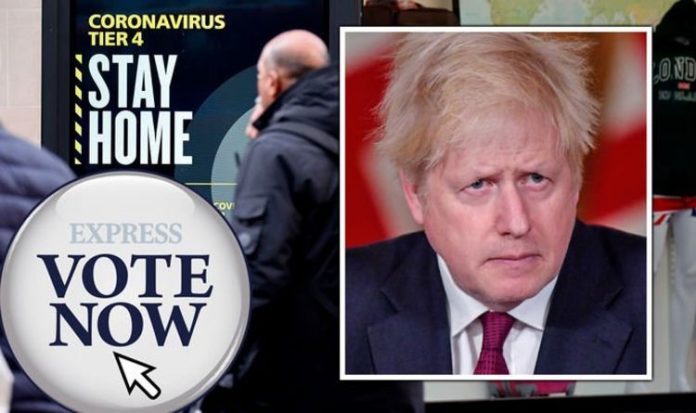The UK Government has refused to rule out putting the country back under the tightest restrictions after Christmas in a bid to avoid another wave of the virus. The southeast of England is already facing the toughest Tier 4 rules as the new strain of coronavirus has been linked to an exponential surge in cases. From today, Sussex, Oxfordshire, Suffolk, Norfolk and Cambridgeshire, Hampshire, and parts of Essex and Surrey will be placed under Tier 4 restrictions.
The five-day easing of restrictions at Christmas was also scrapped because of the transmissibility of the new strain.
The new mutation of coronavirus is now in every part of the UK.
According to Health Secretary Matt Hancock, the new variant has mutated enough to have a “very clear genetic makeup”.
It is known as VUI-202012/01 and is thought to be 70 percent more transmissible.
However, there is no proof that this new variant is more deadly.
Speaking to the Guardian about the need for a nation-wide consistent level of restrictions Andrew Hayward, from the Scientific Advisory Group for Emergencies (Sage), said: “Personally, I think it’s clearer to give a consistent national message.
“This is because although the levels of risk are different in different parts of the country, they’re still there and they’re still substantial.”
This view of having a third national lockdown was also shared by epidemiologist Professor John Edmunds.
READ: US officials investigate surge in coronavirus cases amid fears UK mutation travelled
The new variant of coronavirus that may have originated in the southeast of the UK has now been found in France and in Ireland.
New strains of the deadly pathogen have been found to have mutated in the UK and South Africa.
Now the African Centre for Disease Control has said a new strain of coronavirus has been discovered in Nigeria.
The news from Africa’s disease control body has increased the risk of new world international travel restrictions.
Speaking to reporters about the new variant this week John Nkengasong, the head of the Africa Centers for Disease Control and Prevention said: “It’s a separate lineage from the UK and South Africa.”







